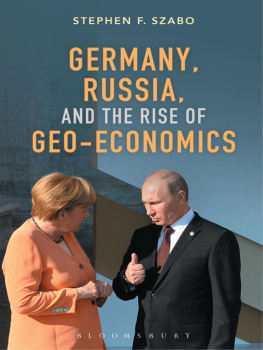The Responsibility to Defend:
Rethinking Germanys Strategic Culture
Bastian Giegerich
Maximilian Terhalle
Appearing just before a historic German election that marks the end of the Merkel era, this excellent and illuminating study by Bastian Giegerich and Maximilian Terhalle could not be more timely. It provides a succinct analysis of the strategic questions besetting Germany and argues forcefully for a more forward-leaning posture.
Dr Constanze Stelzenmller, Fritz Stern Chair, Center on the United States and Europe, The Brookings Institution
Giegerich and Terhalle make a reasoned and urgent appeal for Europes wealthiest state to take responsibility for defending the Western order in which it has for so long thrived but whose strategic foundations it has often neglected. Any German who believes that things can continue as they are at present should read this book.
A. Wess Mitchell, former US Assistant Secretary of State for Europe
This book presents an excellent and comprehensive analysis of the many deficits of current German defence policy. It is a must-read for everyone interested or actively involved in German defence and security policy.
Professor Dr Joachim Krause, Director, Institute for Security Policy at the University of Kiel ISPK
Germanys strategic trajectory remains largely aimless, conceptually, politically and militarily, at a time of growing security challenges. The superbly qualified authors offer a road map to move Germanys security debate from echo-chamber politics to answering the question: what is Germanys power for?
Professor Franois Heisbourg, Senior Adviser for Europe, IISS
The International Institute for Strategic Studies
Arundel House | 6 Temple Place | London | WC2R 2PG | UK
First published June 2021 by Routledge
4 Park Square, Milton Park, Abingdon, Oxon, OX14 4RN
for The International Institute for Strategic Studies
Arundel House, 6 Temple Place, London, WC2R 2PG, UK
www.iiss.org
Simultaneously published in the USA and Canada by Routledge
52 Vanderbilt Avenue, New York, NY 10017
Routledge is an imprint of Taylor & Francis, an Informa Business
2021 The International Institute for Strategic Studies
DIRECTOR-GENERAL AND CHIEF EXECUTIVE Dr John Chipman
EDITOR Dr Benjamin Rhode
ASSOCIATE EDITOR Alice Aveson
EDITORIAL Vivien Antwi, Mubasil Chaudhry, Nick Fargher, Jill Lally
COVER/PRODUCTION John Buck, Carolina Vargas, Kelly Verity
COVER IMAGE: Getty
The International Institute for Strategic Studies is an independent centre for research, information and debate on the problems of conflict, however caused, that have, or potentially have, an important military content. The Council and Staff of the Institute are international and its membership is drawn from almost 100 countries. The Institute is independent and it alone decides what activities to conduct. It owes no allegiance to any government, any group of governments or any political or other organisation. The IISS stresses rigorous research with a forward-looking policy orientation and places particular emphasis on bringing new perspectives to the strategic debate.
The Institutes publications are designed to meet the needs of a wider audience than its own membership and are available on subscription, by mail order and in good bookshops. Further details at www.iiss.org.
All rights reserved. No part of this book may be reprinted or reproduced or utilised in any form or by any electronic, mechanical or other means, now known or hereafter invented, including photocopying and recording, or in any information storage or retrieval system, without permission in writing from the publishers.
British Library Cataloguing in Publication Data
A catalogue record for this book is available from the British Library
Library of Congress Cataloging in Publication Data
ADELPHI series
ISSN 1944-5571
ADELPHI 477
ISBN 978-1-032-12273-1
The question of Germanys underperformance in security and defence has vexed us as authors for years. In 2016, we worked together on an article for the IISS journal Survival exploring the purpose of German power. Thus, in the summer of 2020, when Benjamin Rhode, Editor of the Adelphi series, asked whether there might be a book to be written about German security and defence policy at the end of the Merkel era, we did not need much convincing. Ben deserves an extraordinary amount of credit for moving this project along swiftly and for giving it much greater coherence than the draft version had originally. He also produced the title, which we rather like. The Publications team at the IISS worked as fast and professionally as ever on copy-editing, typesetting, layout and design. Dana Allin, John Chipman and Sarah Raine read parts or all of the manuscript and provided many comments that made it better. Douglas Barrie, Nigel Inkster and John Raine helped to improve our assessments in important aspects. We discussed the subject matter of this book with a number of serving and former officials as well as analysts from Germany and partner countries. Their insights were very valuable and informed the book. Our families deserve special thanks for their exceptional support or, in the case of the children, tolerance for this project.
Germany, led by Chancellor Angela Merkel from 2005 until 2021, is a country that gets many things right. It weathered the 200809 economic crisis better than others. Its citizens enjoy solid economic growth, a high quality of life and strong public services. Even Merkels perhaps most controversial decision to open Germanys borders to about one million refugees in 2015, which at the time appeared to threaten her political survival had the benefit of being admirable from a humanitarian perspective. Compared to more mercurial leaders of other democracies and a growing cast of assertive autocrats throughout the world, Merkel has appeared as a competent, steady and reliable presence. In 2015, she was dubbed Chancellor of the Free World and the indispensable European. In 2020, Germany was, according to some observers, doomed to lead the European Union. Germanys economic and demographic preponderance essentially grants Berlin a veto power over the EUs political direction.
Yet in terms of its security policy, Germany is in a bad way. Years of neglect and structural underfunding have hollowed out the armed forces and created a readiness crisis that will take years to fix. While defence spending has recently increased, those extra funds will be insufficient to meet the requirements identified by defence planners, and the procurement and acquisition process underperforms. Germany is implementing NATO guidelines on defence spending slowly, and occasionally displays a cavalier attitude when it comes to the credibility of NATOs conventional and nuclear deterrence, seemingly impervious to how German national debates resonate among allies. Close partners such as France and the United Kingdom have warned that Germanys restrictive position on arms exports undermines the potential for defence collaboration in Europe, one of Germanys explicit goals.











